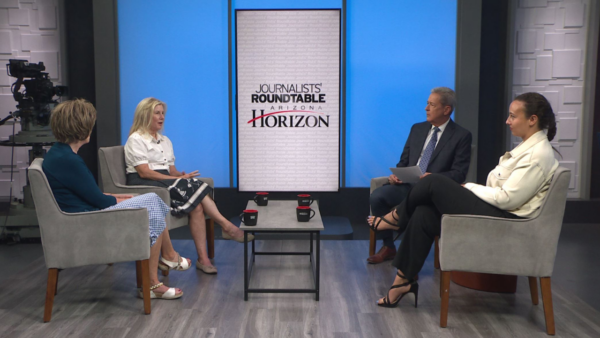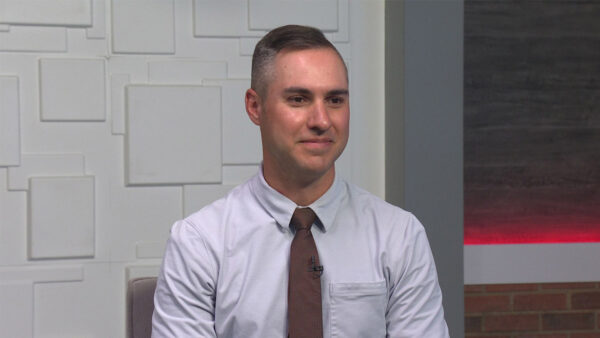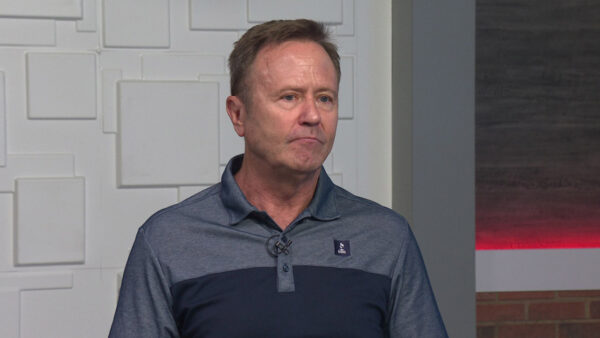State funding for the seriously mentally ill has been cut in Arizona. Richard Clarke, CEO of Magellan Health Services of Arizona, and Dr.
Laura Nelson, interim deputy director of the Arizona Department of Health Services/Division of Behavioral Services, will discuss how people with serious mental illnesses will get the help they need after the reduction in funding.
Ted Simons: At the start of July, state budget cuts began affecting services for thousands of low income Arizonans with serious mental illnesses. Where will they now find the help they need? Here to talk about that are Dr. Laura Nelson, Interim Director of the State Department of Health Services Division of Behavioral Health. And Richard Clarke, CEO of Magellan of Arizona, the state-contracted provider of behavioral health services in Maricopa County. Good to have you both on the show.
Laura Nelson: Thank you.
Ted Simons: Dr. Nelson, the impact of budget cuts on behavioral health services. What are you seeing?
Laura Nelson: It is somewhat early to tell, but as you know, this has been one of the worse budget crisis Arizona has ever seen. We have a decreased 5 to 15% the state general fund revenues for individuals who don't qualify for Medicaid. We have about 14,000 adults with serious mental illness around the state who have seen a tremendous reduction in the benefit package. We've been monitoring very carefully since July 1. So far, we're not seeing any major increase in the use of our crisis services or complaints from our hospital emergency rooms, but we will continue to monitor this very carefully.
Ted Simons: Just so we know, we're talking everything from housing to transportation, crisis services, medication, as well?
Laura Nelson: Exactly. We went from a fiscal budget in 2008 of $127 million for those who don't qualify for Medicaid down to about 62 million. There is about 40 million set aside to help with a medication benefit for adults with serious mental illness and that is about it. They would still have coverage to see their doctors and any necessary blood work they need to get, but no longer have coverage for in-patient stay, residential, case managers, transportation and the like.
Ted Simons: Again, it's been less than two weeks here, but what are you finding from these non-title 19 folks, these folks that don't qualify for access? I mean, they're really in a bind here. Are you hearing anything so far? Seeing anything?
Laura Nelson: One of the strategies we undertook over the last several months, and Dr. Clark can talk a little more about this for Magellan, but statewide we required our regional providers to really reach out individually to all of these 14,000 people and look at what services are you getting today, what is going to happen by July 1 and how can we help you identify other sorts of supports in your community, whether it be family, whether it be friends that kind of thing.
Ted Simons: Is that part of the high-touch transition plan I've been reading about?
Richard Clarke: We're talking about thousands of individual lives of people who are struggling daily with the challenges of a serious mental illness, adults, and the children's arena there are about 2,000 children who are in the same situation of losing their potential benefits that they had. So we developed a system called a high-touch, high relationship, and we felt it was our responsibility with the provider system to touch every single individual by hand and work through an individualized transition plan for them. So whatever services they were getting now, what their new benefit package was and walk through with them all the treatment planning options for them. And not to let go of their hand until such time as that every single person had a plan in place that we felt was safe and clinically sound.
Ted Simons: It sounds logistically daunting. Again, less than two weeks into this, what are you seeing?
Richard Clarke: We started this process in April in anticipation of the budget cuts and there was kind of a three-stage process that happened. We went out and met with all 25 clinic advisory councils that are run by recipients and met with family members and community members and staff and talked with them about the kind of changes that were going to be coming down so they were anticipating them and they could begin to prepare with us. We met with all the peer services organization, we held a series of resource fairs across Maricopa County to prepare people to begin to think about what the resources were that were available to people. And because working with the department and together we had this vision to transition people in a safe, clinical way, we were not in a position where we were going to be abandoning anybody the first of July, so some people are still transitioning. I think some good policy decisions were made by the department to allow for a 90-day transition from brand name medications to generic medications for the majority of individuals, which means we're still working through some of that with individuals so they're still getting a level of support they had prior. Other individuals we're working on their housing, so as we work through the housing issues, we won't let their transition plan go until they're fully secured in a safe, independent or supported housing environment. And as a result of that, we're seeing a system right now that is kind of stable, and we're going to continue to monitor it. We have a team of 12 individuals working with about 200 providers in the community. We meet every day at 4:00 in the afternoon, we assess the system with our crisis providers. Dr. Nelson and I communicate about what the status of the system is and we're going to continue to monitor that.
Ted Simons: Things like clinical care, making that transition, what is involved, challenges there?
Laura Nelson: Many of these individuals are used to having a case manager. They can call their clinic and ask to speak to a particular individual, and that individual will kind of help them navigate in the system. And without having case managers available, this responsibility is falling on physicians in the clinic, nurses in the clinics and other sorts of additional staff that we've tried to put in place to help field those calls and respond to some of these questions coming in. As we were just talking a minute ago, one of the biggest challenges where we've heard the most concern from the community has not been about in-patient or residential, it has really been about the medications. Many folks have been on brand name medications which are extremely costly and don't yet have a generic alternative and we have, at this point, indicated that you can have an additional 90 days to transition to the generic medications. But until we get a better sense of how far this $40 million is going to go that has to last the entire year, we're reluctant to keep that formulary open for the brand name medications.
Ted Simons: That of course includes suicide prevention ideas as well, is that transition going to work? What are we seeing out there?
Richard Clarke: We have a very robust system, and we have across the state and with the department, we have a system that really is centered around the client and the patient, and I think that kind of support is really helpful. But it's important that we do a number of things to keep the system moving in the right direction. It is one of the things that we've developed, as Magellan of Arizona, is a training program called the helpers. In a system like this where Dr. Nelson is saying most of the individuals are losing their case manager, their families and their friends are going to take on more of that kind of responsibility, so we're training people on how to be the role of a helper in a situation like this. We've developed a community partnership program, which is developing a volunteer corp for hot lines and warm lines and individuals who are interested in helping people get transportation to go to their medication visits. We've also funded in Maricopa County to what we call physician extenders, clinical case managers to work with the doctors and the nurses for the individuals who are transitioning on their benefits so that there is some connection there, even though it is not the same case manager, there is still a connection for them to get to their appointments and schedule their appointments. I think what we've -- as a system, I think we've been really proud of, is with the department we've been really focusing on transforming the system into interventions that are sort of state of the art, so in Maricopa we have a nationally-recognized suicide prevention initiative and we're training 2500 practitioners in Mericopa County with how to be with people in their pain and create intervention opportunities to reduce the rate of suicide. We're changing the clinical care management model. We're looking at crisis planning alternatives. We're building out a whole expansion service, so while we've lost a significant number of dollars as it relates to the non-titled individuals, our system is growing and we will continue to fill the gaps in to keep the system moving in the right direction. That gives people a sense we have a system that cares about them and cares about the services we will deliver.
Ted Simons: Last question, quickly, someone with a serious mental illness, someone has a family member in that condition and with those conditions, what do they need to know right now?
Laura Nelson: They need to know there is help in their community, there is help at the department of health services. We have an active website we continue to update, www.azdhs.gov/bhs for behavioral health services and we're providing answers to frequently-asked questions every day and we have customer service available. I would also like to point out one highlight we've seen as a by-product of the last few months is consumers and family members and advocates from across the state are stepping up and pulling together to help each other. There is the development of a consumer and family coalition that meets out of our agency now that has consumers from around the state that are wanting to be a part of the solution as we struggle with this.
Ted Simons: Very good. Thank you both for joining us tonight. We appreciate it.
Richard Clarke: Thank you, Ted.
Richard Clarke:CEO, Magellan Health Services of Arizona;Dr. Laura Nelson:Interim deputy director, Arizona Department of Health Services/Division of Behavioral Services;























